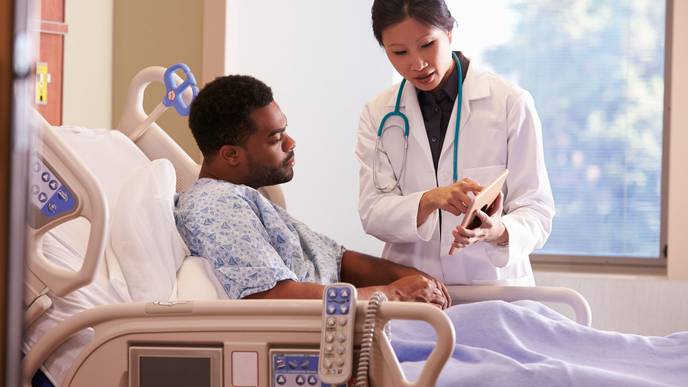Rare Procedure Offers Those Born with Heart Defect Less Invasive Option Than Surgery

07/18/2023
Chloie Ocampo has pursued several life-changing decisions in her early years of adulthood, from taking complete control of her healthcare to determining a career path. The 21-year-old has partnered with Loma Linda University Medical Center’s (LLUMC) Adult Congenital Heart Disease (ACHD) program to recently undergo a highly specialized, minimally invasive procedure for her rare heart condition — one of the first of its kind in the Inland Empire region.
A soon-to-be college graduate, Ocampo says her unique health journey left a lasting impact, reaffirming her desire to pursue a career in pediatric cardiology and help others in the way she’s been helped by experts at Loma Linda University Health.
Ahmed Kheiwa, MD, director of ACHD at LLUMC, says the program at LLUMC is the only comprehensive care ACHD center in the Inland Empire and among few in the United States.
“Our team-oriented collaboration between various sub-specialties allows us to deliver highly specialized and personalized care to each of our congenital heart disease patients like Miss Ocampo,” Kheiwa says.
Read: LLUH’s Adult Congenital Heart Disease Program receives accreditation
Chloie Ocampo hospitalized as a baby.
Congenital heart disease (CHD) is the most common birth defect in the United States, with approximately 20,000 people with CHD entering adulthood every year, according to the Adult Congenital Heart Association. Advances in technology and techniques are ensuring more CHD patients live long, fulfilling lives, Kheiwa says. Among these innovations are minimally invasive procedures like the transcatheter tricuspid valve implantation Kheiwa and his team performed for Ocampo and others living with Ebstein anomaly, a rare type of CHD.
Ocampo received her Ebstein anomaly diagnosis when she was still in the womb and has frequented cardiology appointments for as long as she can remember — first in the Philippines until age 10, then at LLUMC after immigrating to the United States. Growing up, she says she struggled to keep up with her peers’ physical activity, which became most noticeable and discouraging when running timed miles for her physical education classes.
Chloie Ocampo became a competitive swimmer after recovering from her first surgical valve replacement.
In Ocampo’s condition, one of the heart’s four valves, the tricuspid valve, is incorrectly formed and positioned lower than usual in the heart. Instead of flowing out to the lungs, blood might leak backward through the valve into the heart. Kheiwa says improper blood flow causes the heart to work less efficiently, and if left untreated over time, Ebstein anomaly can lead to enlargement of the heart and heart failure.
Kheiwa says patients with Ebstein anomaly usually require a surgical intervention early in life to repair to replace their heart valve. Ocampo underwent two open-heart surgeries performed by world-renowned heart surgeon Leonard Bailey, MD, between the time she was 11 and 13 years old — a heart valve repair followed by valve replacement. The following years were the most active of Ocampo’s life, she says, as she swam competitively for her high school team.
Over several years as patients enter adulthood, however, surgical valves tend to wear down, says Kheiwa. Instead of patients enduring another open-heart surgery to fix or replace their valve, Kheiwa says specialized teams like those at LLUMC’s ACHD program can do it all through a small incision using transcatheter technology. The minimally invasive procedure possesses many benefits compared to open-heart surgery, he says, including a faster recovery, no scarring, and less risk of complications.
Ocampo underwent her transcatheter tricuspid valve implantation in May and has since resumed her daily routines of attending college courses, crocheting and sewing, and running with her sister and dog. Compared to her previous open-heart surgeries, Ocampo says she appreciated the swifter, painless recovery from the procedure that allowed her to remain independent.
Chloie Ocampo is a big fan of amusement parks and rollercoasters, including those at Disneyland.
She is among the first generation of CHD patients to benefit from this minimally invasive alternative to open heart surgery for valve replacement, Kheiwa says.
“CHD patients are a younger demographic than many other cardiac patients,” he says. "It is especially rewarding to care for these young adults with goals and expectations for the lifetime ahead of them and use our skills and technology to make sure they have the opportunity to live those long, happy lives.”
As she wraps up her college studies, Ocampo says she is casting her sights on a career in pediatric cardiology, where her journey started.
“I am in awe of the medical team and nurses who have been so generous in helping me throughout my cardiac journey,” she says. “I want to enter this healthcare field to give some of that back to the community.”
LLUMC’s ACHD program continues to improve and provide patients with state-of-the-art care, says Kheiwa, from offering highly complex interventions to utilizing the latest equipment and strengthening teams’ collaborative decision-making.
“Our care team’s combination of skills and knowledge allows us to provide patients like Miss Ocampo with the best care possible,” he says. “Our goal is to continue offering this personalized care to every patient that walks through our doors."
Learn more about the Adult Congenital Heart Disease program online, email ACHD@llu.edu, or call 1-844-440-2243 to schedule an appointment.

Facebook Comments